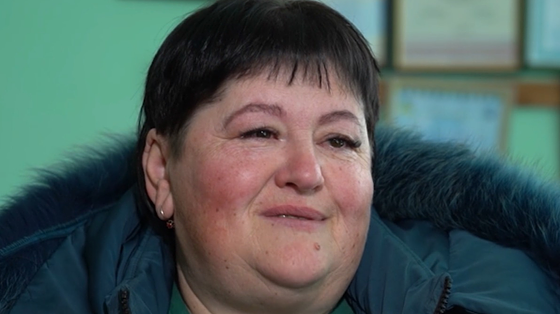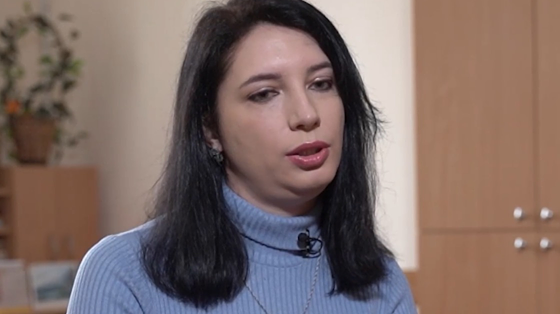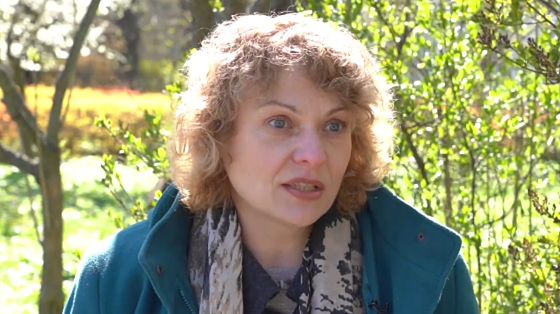‘For me, the war means...’
...destruction, ruined life, hatred
When did the war in Donbass begin for you?
For me, the war in Donbass started somewhere in May 2014. There was no particular day. I realized that everything was falling apart. I worked for a real estate agency in Donetsk; our office was in Treneva Street. We got out to take some air and saw jet fighters above us. There were several of them, they were going towards the Donetsk airport. There were some explosions, some strange smoke, and these were the first signs of some hostilities.
It was worrying as on my way home I had to pass by the Donetsk airport. I was anxious about how I would drive home with shots and explosions around. The Donetsk administration building had been seized some time ago, about three months ago.
In a real estate agencу where I was working it was getting clear that my two-year efforts were crumbling down; people for whom I was picking apartments, whom I was going to sell flats in Donetsk, Kyivskyi district, all my contacts, all that was starting to fall apart within several days. My clients were saying that they were no longer buying apartments in the city and were leaving it.
Did you happen to see military actions with your own eyes?
I didn’t experience hostilities very close; I just saw their aftermath, armed people and heard some remote shots.
What did you talk about with your family and neighbours during active hostilities?
We mostly discussed what to do in case of an attack. So, usually, it was about safety, how to leave safely.
It was clear that some battles were going on, but not clear how far and how long it would last. It was expected not to last long, and that some agreement would be reached. We were completely at a loss.
What do you remember the most from the experience you went through during the war?
Storming of the Donetsk Regional Administration building, in March 2014. I saw people storming the building, I saw a crowd of people, extremely aggressive, you could feel their aggression and hatred. I realized that those people were not my neighbours, as if I was no longer connected with them, but alien to them.
Earlier, it was comfortable for me to live in Donetsk; I liked the city. After the storming of the Regional Administration building, I felt that the society split into two halves; I was part of one of them. When hostilities in the city and region were scaling up, it became clear where it was going.
We tend to erase unpleasant events from our memory. What event from the beginning of the armed conflict in Donbass would you like to forget about (cannot forget)?
I’ve been lucky in this sense. I have not witnessed fierce hostilities, cruel turning points, people killed.
Yet, there were very uncomfortable moments in Donetsk and other towns: cars with armed people inside, groups of four to five people who were sure they could do whatever they wanted, guided by their own ideas of law.
Did you relocate because of the war?
I have moved out because of the war. At first, I had a lot of options where to move to, but I was not sure where. At first, I moved to the town of Berdiansk where an acquaintance of mine offered me a job during a tourist season. So, I moved to Berdiansk for a week, but it did not work out: all the country was on the brink of the war. Then I decided to go to Moscow where my mother had lived for many years, to calm her down. I had to service a loan. Before the war I had had a very good credit record, and I did not want to destroy it. I worked in Moscow for half a year to pay loans and to decide what to do. On 1 January 2015, I came back to Ukraine.
Do you plan to come back home when the war is over?
Yes, I’d like to come back if it starts to recover to pre-war life. Before the war, the city had good prospects, it had many good things.
How has the war changed your life?
My pre-war views and positions were different; they have changed for now. Many problems no longer seem important. I have developed some kind of lack of fear. There are many things I have stopped to fear.
Tell us please how the war affected your everyday life.
It changed it during hostilities. It has come back to normal when hostilities were over. But now, I have some thoughts about what to do in case of hostilities. What things to put in a bag if you have to flee. Where to hide the most valuable things: to hide or take with you? What would happen to your relatives? Would they be able to leave? So, I have a lot of such things to think about, which I did not have before.
Do you feel safe now? What helps you feel safe?
Yes, I do. Druzhkivka where I live now has neither military activities nor armed people in cars, armed groups I told you about.
What do you dream about?
I dream to live a normal life, to develop. I dream about the war to end. A war takes a lot of resources; nothing is being built here as hostilities are close.
What is happiness for you?
Everyone has his or her own idea of happiness. For me, it is the possibility to have a normal job, normal life.
What has become the greatest value for you over the last years?
The biggest values are the family and health of your close ones. And a feeling of freedom, lack of oppression. Many of my values are now much clearer for me.
What did you learn while overcoming all those difficulties you told us about?
‘I learned to live without money. While all my previous life was about getting some money, now I take it much easier: money is not the most important thing.
In your opinion, what organization or individuals helped civilians the most during the conflict?
The Red Cross, the Rinat Akhmetov Foundation, and some other organizations.







.png)



